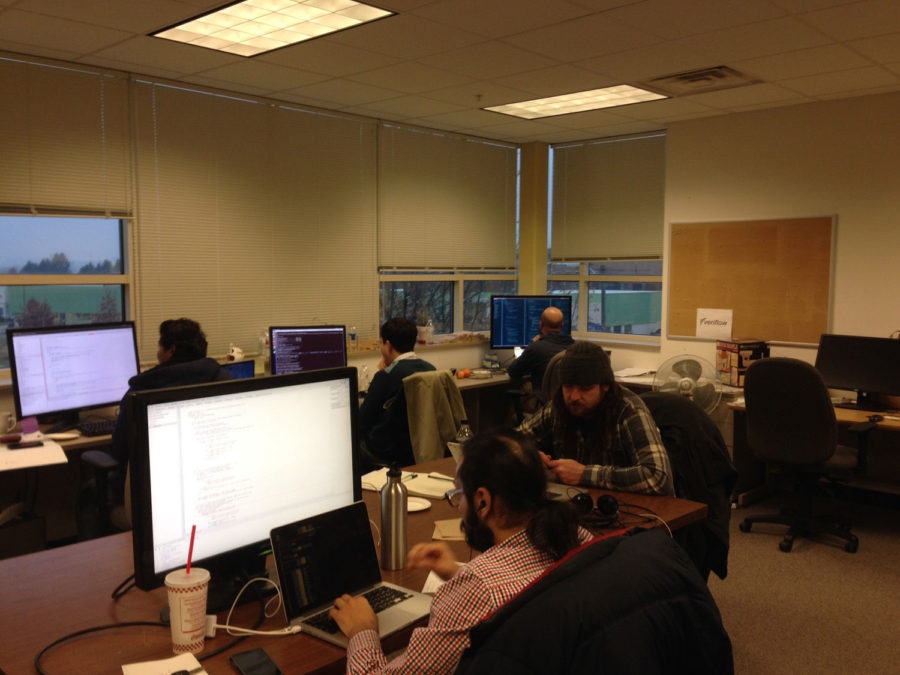Office of Technology Management, other resources help campus startups succeed
Members of the Veriflow Systems aim to commercialize a new approach to enable highly secure networks.
December 9, 2014
The University has a track record for fostering innovation on campus by providing resources to startups. In the past five years, the University has licensed more than 35 startups, including three for the 2015 fiscal year.
Over 55 active startups across the country can trace their roots to the University, according to the Office of Technology Management’s Fiscal 2014 Annual Report.
Voxel8, Veriflow Systems and Rithmio are three startups that have been licensed in the past few months.
Brighten Godfrey, co-founder of Veriflow Systems and assistant professor of computer science, said his company is commercializing a new approach to enable highly secure networks.
“The University has been doing a lot to encourage startups, and it’s been very helpful to us both from encouragement from the department and from EnterpriseWorks,” said Godfrey.
Get The Daily Illini in your inbox!
The Office of Technology Management is where a startup begins its multi-stage creation process, including licensing the intellectual property of the University. EnterpriseWorks is a startup incubator, helping other startups after receiving licensing, along with providing mentoring from external resources brought in by the University.
Lesley Millar-Nicholson, director of the Office of Technology Management, said the general process for protecting intellectual property and working with startups has not changed much over the years, but what has changed is the number of resources available to support the process.
“We did not used to have the plethora of resources that we have now and I think what we found is that it takes more than money to start a company,” Millar-Nicholson said.
Godfrey said his startup found many of these resources helpful, such as I-CORPS, an entity of the National Science Foundation that helps startups learn about their markets.
“The startups have the opportunity to work with (local entrepreneurs) to get regular advice and feedback on the process … graphic design, various other things that are included in the package that was helpful in getting launched,” Godfrey said.
Millar-Nicholson said the office gives 30 to 40 licenses a year, and 10 percent or less are for startups.
“Effectively, it is a bundle of rights,” Millar-Nicholson said. “Intellectual property can come in the form of copyright or patent. When you patent something, you’re not actually given anything, what you’re given is the right to exclude others from using it.”
The office signs a contract with startups, allowing them to use a technology or product developed at the University, as long as they pay for that right and develop the technology, Millar-Nicholson said.
When a new technology or product is developed at the University, the faculty or students working on it can disclose it to the office. Then, the office can file for a U.S. patent. If they are issued a patent, the University has the right to issue a license to a startup or existing company.
In the 2014 fiscal year, 78 U.S. patents and 38 licenses were issued to startups fostered by the University.
The number of startups has been somewhat steady over the past few years, fluctuating between five to six startups from fiscal years 2010 to 2014 with a spike of 12 in 2011.
But not all startups make it. Millar-Nicholson said the number of startups that fail varies, but she knows of a couple that have recently. A “crash and burn” failure doesn’t happen very often, Millar-Nicholson said, and the termination of startups can happen slowly years after they began.
“Termination could be they are just not using the technology,” Millar-Nicholson said. “Another could be the company folds, then we had one company fold. They just could not scale up; the technology was not advanced enough for what the market was needing.”
Working with startups can have its challenges, but Millar-Nicholson said it’s all about balance.
“We want to make sure that the company is viable, has got good business management, has appropriate funding lined up or has a mechanism to raise funding because we are effectively entrusting a piece of intellectual property with a patent, 20 years of life, to a company that has no track record,” Millar-Nicholson said.
Laura Bleill, assistant director for external relations for Research Park, said there are many ways for students to get involved with startups. EnterpriseWorks employs 12 to 14 interns of various disciplines. Bleill said the startups themselves occasionally need interns, especially for the summer.
The Technology Entrepreneur Center, which Bleill said focuses more on students, hosts the Cozad New Venture Competition in the spring to encourage students to create business ideas and compete for funding from venture capitalists. Funding and prizes totaled near $200,000 last year.
Andrew can be reached at [email protected].







